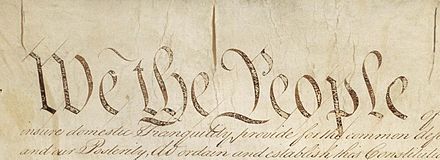From FFF

Constitution, We the People.
(Image by (From Wikimedia) Constitution_Pg1of4_AC.jpg: Constitutional Convention derivative work: Bluszczokrzew (talk) / Const, Author: See Source) Details Source DMCA
The United States was founded as a limited-government republic. That meant a federal government with very few and limited powers. That's what the Constitution was for, not only to bring the federal government into existence but also, at the same time, to set forth its few, limited powers. If a power wasn't enumerated, then the federal government was not authorized to exercise it. A close examination of the Constitution shows how few and limited such powers were.
Why didn't the Framers instead use the Constitution to bring into existence a government with omnipotent powers? After all, in this new governmental scheme, the president and the Congress were to be democratically elected. Why not vest them with the power to do anything they deemed necessary and beneficial to the country? Why tie their hands with few and limited powers?
The reason is simple: The American people would never have accepted that type of government. Remember: After the Revolution, the American people had been operating for 13 years under the Articles of Confederation, a type of governmental system in which each state retained its independence and sovereignty. Under the articles, the states had simply come together in a confederation. Under this type of governmental system, the federal government's powers were so few and limited that the federal government didn't even have the power to tax.
That's the way the American people wanted it. The last thing they wanted was a federal government of general, omnipotent powers to do the "right" thing for the nation. Americans were convinced that that type of governmental system would end up being a grave threat to their freedom and well-being.
Thus, our American ancestors were not enthusiastic about the proposal for a new federal government that came out of the Constitutional Convention. Don't forget that the purpose of the convention was simply to come up with modifications to the Articles of Confederation. That's what Americans were expecting, that after the Constitutional Convention they would continue operating under the Articles, albeit in modified form, with each state retaining its autonomy and sovereignty within the confederation.
You can easily see how our American ancestors viewed the threat they believed the new government posed to their freedom and well-being by examining the Bill of Rights. It really should have been called the Bill of Prohibitions because it doesn't give anyone any rights. Instead, it prohibits the federal government from depriving people of their fundamental, God-given rights, rights that preexist the federal government. The reason Americans insisted on the passage of the Bill of Rights was because they were sure that the president and Congress, albeit democratically elected, would end up doing the things proscribed in the Bill of Rights e.g., destroying freedom of speech, freedom of religion, freedom of the press, the right to keep and bear arms, killing people and seizing their property without due process of law and trial by jury, and inflicting cruel and unusual punishments on people.
After 1945, the federal government was converted from a limited-government republic to a national-security state, a type of governmental structure in which the government is vested with omnipotent powers to protect the citizenry from domestic and foreign threats.
In a national-security state, the two most important words are "national security." Everything revolves around "national security," even though the term has no definable meaning. The government wields the power to determine what constitutes a threat to "national security" and what shall be done to resolve the threat.
In America's governmental system, that power is vested in the national-security branch of the government, which consists of the Pentagon, the CIA, and the NSA. In other national-security states, such as those in China, Egypt, North Korea, Cuba, and Russia, the omnipotent powers to protect "national security" are vested in the government generally. When the U.S. government joined the ranks of national-security states, it retained the limited-government structure consisting of the executive, legislative, and judicial branches and then simply vested the national-security branch with the omnipotent power to protect "national security."
Thus, today we live under a regime in which the federal government, operating through the military and CIA wield the omnipotent power to seize American citizens, place them into military dungeons, hold them indefinitely, and torture them. The military and the CIA also wield the power to assassinate American citizens that is, simply kill them without due process and a trial. The NSA wields the power to conduct secret surveillance schemes on the citizenry. All such powers have been confirmed by a federal judiciary, which, like the other two branches, passively submitted to the omnipotent power of the national-security branch soon after the conversion took place.
The national-security branch, in combination with the president, also now wields the power to send the nation into war without a congressional declaration of war, notwithstanding the fact that the Constitution expressly delegates that decision to Congress. Operating with the president, the Pentagon, the CIA, and the NSA also wield the power to initiate coups, intervene in foreign conflicts, bribe foreign regimes, sanction foreign regimes and foreign citizens, form alliances with dictatorial regimes, torture and assassinate foreign citizens, and conduct secret surveillance in foreign countries.
In other words, we live under a totally different governmental system than what was proposed and brought into existence after the Constitutional Convention. In fact, if proponents of the Constitution had told our American ancestors that the Constitution would bring into existence a national-security state, they would have laughed and never approved the deal. They would have instead chosen to continue operating under the Articles of Confederation, where, again, the federal government didn't even have the power to tax.
Why was the federal government converted to a national-security state after World War II? Officials claimed that the conversion was necessary to protect the United States from the supposed threat posed by communist national-security states, especially the Soviet Union, which, ironically, had been America's partner and ally during World War II. If the United States didn't also become a national-security state, like the Soviet Union, anti-communist proponents claimed, the U.S. would end up falling to the communists in the upcoming Cold War.
That's how America has ended up as a national-security state. The conversion took place without even the semblance of a constitutional amendment. Moreover, once the Cold War was over in 1989, Americans, not surprisingly, did not get back their limited-government republic. Instead, America became a permanent national-security state.
(Note: You can view every article as one long page if you sign up as an Advocate Member, or higher).





